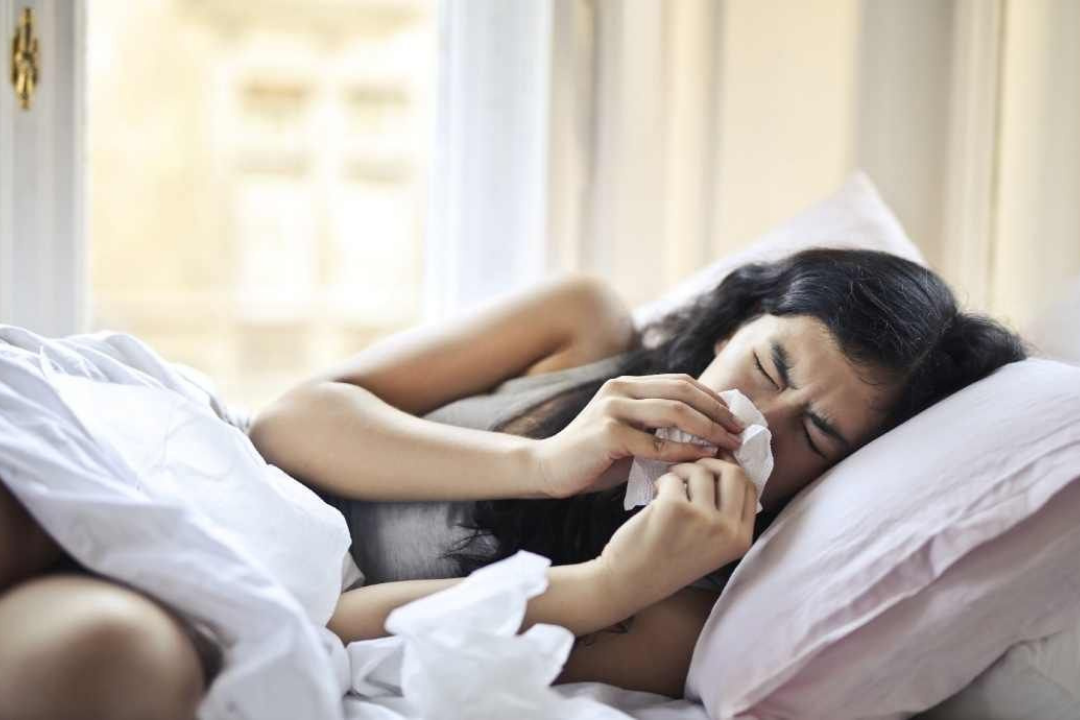Spring is coming, along with the unfortunately familiar itchy eyes, runny nose, and regular sneezing of seasonal allergies. Up to 40% of Americans suffer from allergies, or allergic rhinitis. If you also suffer from sleep disorders like insomnia or sleep apnea, those seasonal allergy symptoms can result in even less sleep and more miserable days.
But can allergies make you tired? Yes.
Symptoms of allergies include fatigue, along with sneezing, itchy or runny nose, watery eyes— and for many, poor sleep. Often the brain fog and “out of it” feeling many describe, is in fact, fatigue brought on by the internal inflammation that occurs when suffering from an allergy response.
When you’re exposed to allergens like pollen or grass, your body creates an immune response by producing cytokines. Cytokines are proteins that help you fight infections and help you fight off foreign substances like pollen. When cytokines are released, inflammation in the nasal passage leads to narrowed airways and congestion. If the inflammation continues for longer periods of time, your brain and thinking may get foggy. The longer it continues, the more exhausted you’ll feel and the harder it is to function throughout the day.
Allergy sufferers are also more than twice as likely to have insomnia than those without. Without good sleep at night, you’re going to feel more tired throughout the day.
Seasonal Allergies and Sleep
Exposure to allergens, such as dust, pollen, and dander, also causes irritation when they enter your nasal passages. This triggers uncomfortable symptoms like congestion, sneezing, and watery eyes. These symptoms affect your ability to breathe easily and tend to worsen at night— two reasons why allergies commonly lead to poor quality sleep and leave you feeling tired in the morning.
Your allergies don’t just impact your ability to fall asleep, they also interfere with your ability to stay asleep. People with allergies may wake up due to nasal congestion, or sneezing or coughing fits during the night. This kind of allergy-induced sleep deprivation adds up, creating a vicious cycle that leads some to rely on sedatives or alcohol to help them fall or stay asleep.
Even short-term sleep deprivation can have devastating health consequences, which we discuss in our article Five Shocking Ways Sleep Deprivation Affects Your Body.
There are steps you can take to help relieve nighttime allergies that disturb your sleep or keep you awake at night. If your allergies are making you tired and you’re looking for relief, check out our article 8 Tips for Nighttime Allergy Relief.
Sleep Disturbances Exacerbate Sleep Disorders
Allergies can affect all aspects of sleep. If you have moderate to severe allergies you are significantly more likely to suffer from sleep issues including:
- Insomnia
- Trouble falling and staying asleep
- Increased snoring
- Increased risk for sleep apnea
- Poor sleep efficiency
- Short sleep
Your problems don’t end during the day. You’re more likely to have trouble waking up, experience daytime fatigue, and have morning headaches, brain fog, and sinus pain.
For some with moderate to severe allergies, difficulty sleeping may develop into more serious sleep disturbances including insomnia, snoring, or obstructive sleep apnea (OSA).
If you have OSA, it is particularly concerning because of the increase in airway obstruction. Allergies create nasal congestion, which can dry out your mouth or block your airways. Both of these factors can lead to apneas– the stops in breathing overnight that characterize OSA.
If you have nighttime allergies and obstructive sleep apnea you may be struggling to breathe easily with your CPAP equipment or have additional questions about how it may affect your treatment.
Related: Allergies and Sleep Apnea
If Your Symptoms Are Overwhelming, Seek Help
If you have other symptoms indicating sleep-disordered breathing such as snoring or you stop breathing while you’re asleep, and they worsen during allergy season, it may indicate a need for a sleep test to determine if you have OSA. It’s important to know whether it’s only your nighttime allergies temporarily affecting your sleep, or if it’s something much more serious. A simple home sleep test can help.
A sleep test can identify any underlying conditions that may be keeping you up at night, and proper treatment can help you start getting a full night’s rest again.
If you are struggling with seasonal allergies and your sleep and quality of life are disrupted as a result, contact us today to schedule an assessment of your current situation.
References:
- Léger, D., Annesi-Maesano, I., Carat, F., Rugina, M., Chanal, I., Pribil, C., El Hasnaoui, A., & Bousquet, J. (2006). Allergic rhinitis and its consequences on quality of sleep: An unexplored area. Archives of internal medicine, 166(16), 1744–1748.
https://jamanetwork.com/journals/jamainternalmedicine/fullarticle/410859 - A.D.A.M. Medical Encyclopedia. (2020, February 2). Allergic rhinitis. Retrieved November 12, 2020, from https://medlineplus.gov/ency/article/000813.htm
- https://sleepcenterinfo.com/blog/5-shocking-ways-sleep-deprivation-or-insomnia-affects-your-body/
- Liu, J., Zhang, X., Zhao, Y., & Wang, Y. (2020). The association between allergic rhinitis and sleep: A systematic review and meta-analysis of observational studies. PloS one, 15(2), e0228533. https://journals.plos.org/plosone/article?id=10.1371/journal.pone.0228533
- https://sleepcenterinfo.com/blog/are-you-oversleeping-10-causes-of-excessive-sleep/

